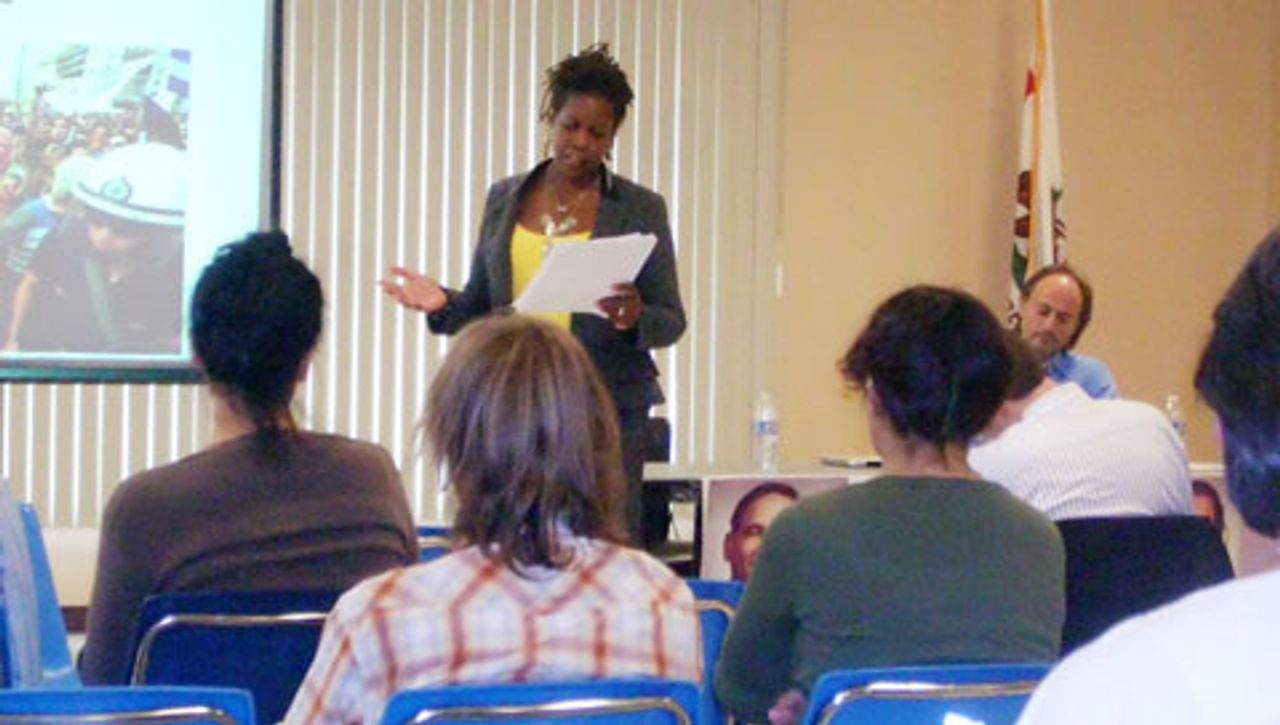 Scherrer addressing the meeting in Huntington Park
Scherrer addressing the meeting in Huntington ParkSocialist Equality Party vice presidential candidate Phyllis Scherrer concluded her West Coast tour with a meeting in Huntington Park in Los Angeles County on Saturday. The well-attended meetings followed one two days earlier in Berkeley.
At both meetings, Scherrer discussed the basis of the SEP campaign, focusing particular attention on the significance and political lessons of the Chicago teachers’ strike, which ended Wednesday.
The Chicago teachers’ strike, she said on Saturday, gave expression to social and political conditions that are universal, with the entire political establishment lining up against the working class. “The Chicago teachers are under attack from the Obama administration. Mayor Rahm Emanuel, in addition to being Obama’s former chief of staff, is now head of his chief fundraisers.
“The strike exposes the whole character of the political system, including the election,” Scherrer said. “As soon as it began, Republican vice presidential candidate Paul Ryan expressed agreement with Emanuel against the teachers.
“This strike pitted teachers not only against the Democratic Party, but against the Chicago Teachers Union and its supporters in middle class ex-left groups like the International Socialist Organization. They accept the framework of capitalism, that there is no money for things like education.”
The current US elections are a “mockery of democracy,” Scherrer said, in which an estimated $3 to $6 billion will be spent to advocate by two campaigns that agree on all fundamental issues central to the interests of the working class.
“The economic recovery celebrated by the Obama administration is largely fictional. It is a recovery of stock market and corporate profits based on a savage attack on the jobs and living standards of US workers, and an ever-greater transfer of wealth from the bottom to the top. Since the beginning of the so-called recovery two years ago, 93 percent of all income gains have gone to the top one percent of the US population.”
Scherrer’s presentation concluded with a moving video of Socialist Equality Party presidential candidate Jerry White’s recent tour of Sri Lanka, which Scherrer noted gave expression to the SEP’s commitment to internationalism. The video showed White’s tour of rubber plantations and highlighted the squalid conditions facing the Sri Lankan working class.
A question and discussion period followed the presentation.
One young worker in attendance, Adam, immediately drew a parallel between his own experiences and those of the Sri Lankan workers seen in the video.
“I work for a company that manufactures precision measuring equipment which is mostly used by farmers in the Fillmore area, [a region two hours northwest of Los Angeles], but we often have to make deliveries up to the Central Valley, sometimes driving six hours each way to get there.
“It’s a difficult job and I find myself regularly working eighteen-hour days, which a lot of people can’t believe when I tell them. In addition to manufacturing the equipment and hoping it passes QC [Quality Control], I’m also responsible for delivering it and then setting it up at the customer site. This all has to be done under strict time limits.”
Another young student asked about the proliferation of temporary work and temporary workers as part of the so-called economic recovery and what the Socialist Equality Party’s position on it was.
Scherrer responded that this was all part of a protracted process of deindustrialization carried out by the ruling class and that she regularly witnessed the phenomenon in her home city of Pittsburgh. Pittsburgh was once a booming steel city, but now thousands of workers are forced to work for poverty wages and no job security. She explained that this was what the Obama administration really means when it celebrates the phenomenon of job “insourcing”—i.e., bringing manufacturing back to the US on the basis of driving wages and working conditions down.
Several in attendance stayed afterwards to discuss their impressions of the meeting.
Selene, a student at the University of California Riverside, said that the meeting had prompted her to reflect on the attack on public education, especially at the university level. She expressed worries about graduating, as there currently aren’t enough professors to teach the classes she requires. “This is mostly affecting incoming freshmen, but it is also affecting the university as a whole.”
Norissa had recently attended the University of California San Diego and now works full-time as a caretaker for a family member.
“What has made me attracted to the perspective of the SEP and IYSSE [International Youth and Students for Social Equality] has been its emphasis on class rather than on identity politics, which seem to prevail on college campuses in particular. This has been a big problem as many of the student groups which have emerged to protest tuition cuts and class size increases all start with disdain for Marxism and the class struggle, and therefore they are completely incapable of leading the students and workers on the campus forward.
“It was also good that the role of the unions was brought out,” Norissa added. “While I was at UCSD, I also worked as an administrative aide and was a member of the Coalition for University Employees. I was so angry when I read Article 20 of the contract, which was a no-strike clause. When I was laid off earlier this year, it was under the exact terms agreed and proposed by the union, in terms of number of days notice given, etc.
“I think the fact that Phyllis was able to link up what’s happening with Chicago teachers to the growing polarization of wealth in the US and even to rubber plantation workers in Sri Lanka, testifies to the power of a genuine Marxist perspective.”
